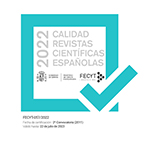From Tropical Flora to Neotropical Flora: José Cuatrecasas and his botanical works
Abstract
The aim of this article is to present the life and professional trajectory of José Cuatrecasas Arumí (1903-1996), one of the 20th century's most important Spanish botanists. Therefore, this is a historical study that intends to link the historical circumstances Cuatrecasas experienced with his training as a botanist. This Catalan botanist developed his work in various settings (Barcelona, Madrid, Geneva, Berlin) from his early studies to his doctorate and postdoctoral training, but he began to take an interest in tropical flora from the late 1920s and, more importantly, from the 1930s onwards, when he obtained a chair of botany at the Facultad de Farmacia of the Universidad de Madrid and also became part of the Real Jardín Botánico of Madrid by directing its Tropical Flora Section. The Civil War permanently disrupted the development of his scientific career in Spain, as his Republican militancy forced him into exile. Initially in Colombia and later in the United States, Cuatrecasas continued his lines of research on tropical flora, completing them in the 1960s with an ambitious project in the field of Neotropical Flora. This is how the life and scientific curriculum of one of the best Spanish botanists of the 20th century was forged.
Downloads
Article download
License
Mediterranean Botany is an open access journal to promote global exchange knowledge. It facilitates unrestricted access to its contents from the moment of publication in its electronic edition. The originals published are property of the Universidad Complutense and it is mandatory to cite such source in case of total or partial reproduction. All contents are distributed under a Creative Commons License 4.0 (CC BY 4.0). This circumstance must be expressly stated in this way when necessary. You can check the informative version and legal text of the license.














